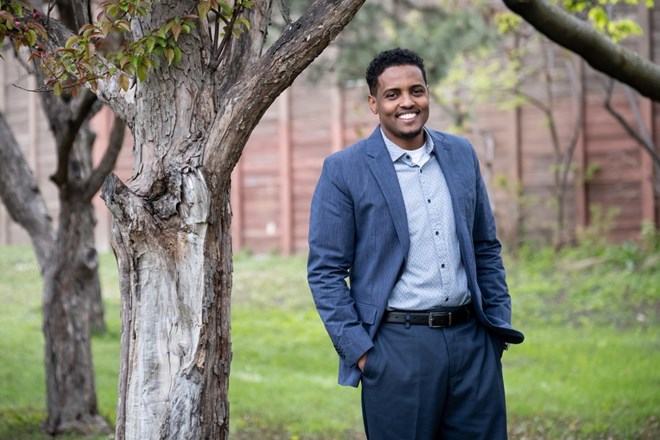
By Mohamed Ibrahim
Monday September 21, 2020

Jamal Osman Credit: Caroline Yang
MINNEAPOLIS (AP) - Before he became Minneapolis’ newest City Council member, Jamal Osman taught a mental health first aid course designed to help people in crisis. Among his students over 3 1/2 years: police officers.
The work gave Osman a unique perspective in a city where many are still clamoring for changes in policing four months after George Floyd’s death while being arrested by four officers. Osman would like to see officers undergo more training like he gave. Whether they do or not, he favors a more socially conscious approach to policing, including expanding a program that has had specially trained people join officers on calls for people in crisis.
“I don’t even see me changing my job to something different than what I was doing already,” said Osman, who spent 15 years in social services before running for office. “It’s just on a bigger scale.”
Osman’s election in August filled a seat that had been vacant for six months. Though the council member from the neighboring ward solicited Ward 6 residents’ views on issues, they had no council vote during a tumultuous period that included not just Floyd’s death but also the onset of the coronavirus pandemic.The ward includes six Minneapolis neighborhoods and is home to one of the largest East African communities in the country. The pandemic pushed many of the area’s small businesses to the brink; the arson and violence that followed Floyd’s death spread to a stretch of Lake Street in Osman’s ward and other parts of his district, including a Cedar-Riverside pawn shop that was burned down.
The neighborhood’s business association set up a fundraiser with the goal of raising $25,000 for damaged businesses and it helped members navigate the process of applying for federal relief money.
“We didn’t have anyone necessarily that could come be an official person to talk about what this risk was,” KJ Starr, owner of The Wienery restaurant, said. “It was sad for the West Bank that we didn’t actually have that. We scrambled that together by ourselves without official help.”
Osman, 37, came to the United States from Somalia as a teenager. After earning his bachelor’s degree in social science from Metropolitan State University in St. Paul, he held various nonprofit jobs, including working as an employment counselor and to educate East African community members about mental health resources. He worked most recently as a resident advocate in an affordable housing high-rise in Minneapolis.
After Abdi Warsame left the city council, Osman emerged from a field of nearly a dozen candidates to win the seat. Housing was paramount among Osman’s campaign issues, from further expanding renters’ rights to creating more affordable housing opportunities for low-income individuals and people experiencing homelessness.
Osman, in an interview, called the city’s police department “broken” and beset by a culture of racism. But he doesn’t support dismantling or abolishing it, citing the concerns of many residents who he said rely on the police for safety.
It’s not a view everyone in the ward shared. Some youth got behind calls to dismantle the department. Iqbal Abdi, an Augsburg University student and youth outreach coordinator who lives in the ward, said younger residents have more frequently had negative experiences with officers that make them more willing to demand change.
Burhan Israfael, a local organizer, said the reliance on police for safety is only due to a lack of alternatives. Israfael, who helped coordinate neighborhood watch efforts during the Floyd unrest, said younger residents of the ward felt their ideas on reforming police weren’t heard by Warsame.
“It was definitely that representation where people’s voices were not being heard, it just goes into the abyss - that’s what it felt like honestly,” he said. “Now you had a large uprising in ideas and creativity by a lot of youth in our community and there was no representation of that, there never was.”
Warsame declined to comment.
Michele Braley, who lives in the Seward neighborhood and runs a local restorative justice nonprofit, said she voted for Osman because his social services background makes him uniquely qualified to meet his constituents’ needs.
“There can be a limitation to that approach - you can’t run the whole city as a social service,” she said. “But in the instances of the opioid crisis (and) the housing crisis, I think that Jamal’s social services experiences will actually serve us well.”
Indeed, when Osman talks about his top priorities, it’s housing rather than policing that emerges.
One of his first priorities is to address homeless encampments in the city through housing, along with providing support to businesses in the ward still contending with the pandemic and reeling from damages following the unrest. He is also part of an effort to open a youth outreach center to help address youth homelessness and opioid addiction.
The council seat is up for re-election in November 2021, giving Osman a short time to prove himself to voters.
“I have a very short time and I think the community wants to see something on the table,” Osman said. “And that’s what I’m going to do.”